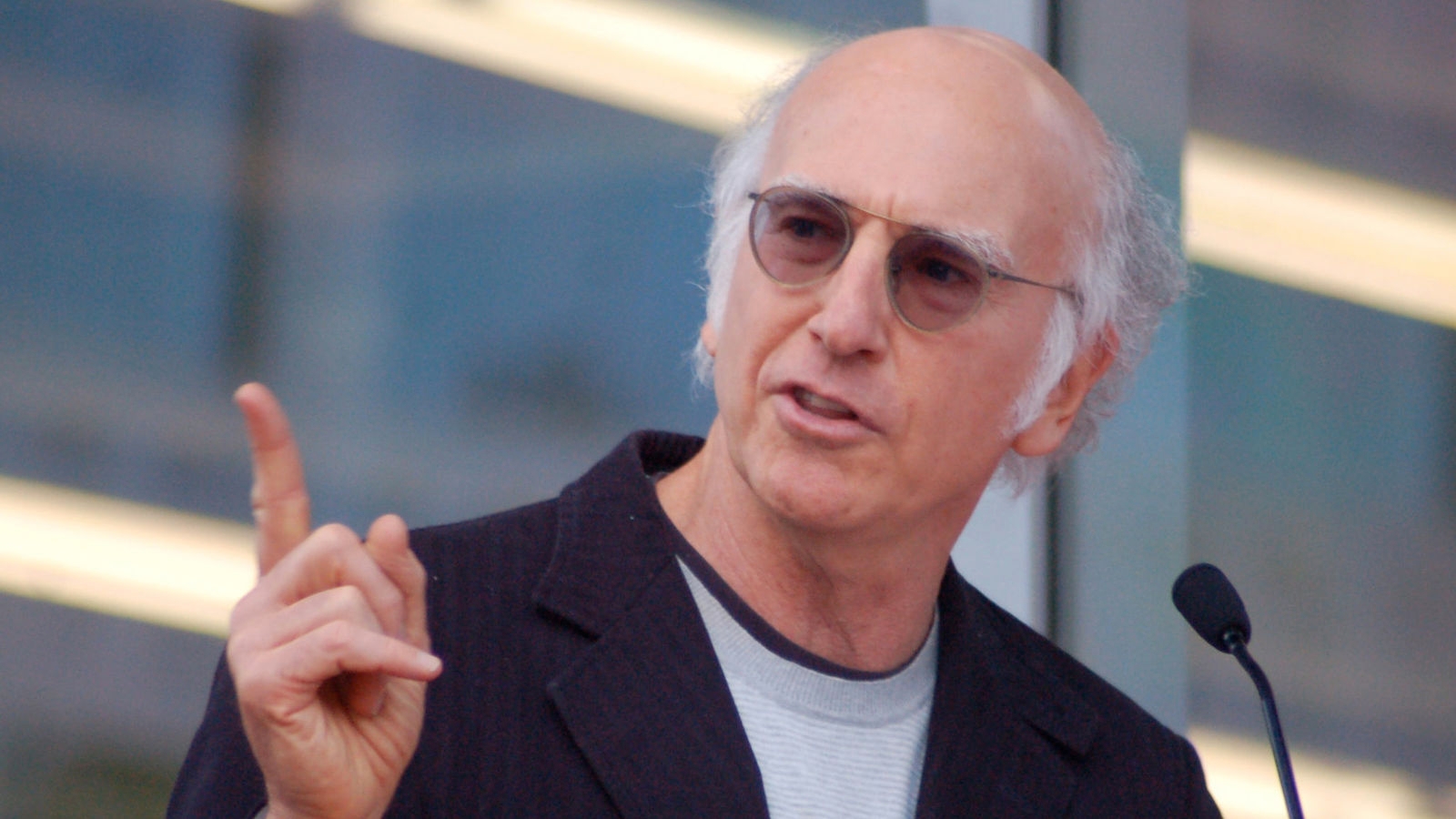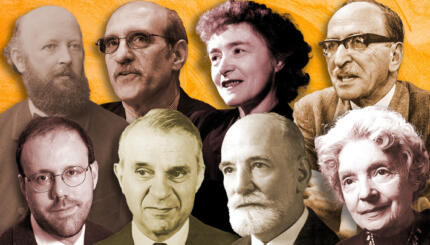The 1990s were the decade of Jews, and Jewish culture, blazing their way into the television mainstream. There were numerous contributors to this occurrence, but only one need be specifically singled out: the groundbreaking NBC series Seinfeld, in which stand-up comedian Jerry Seinfeld reinvented the sitcom as a dazzling exploration of nothingness. Seinfeld was a show about four Jews in which only one — Seinfeld himself — was explicitly identified as Jewish. Judaism, and specifically Jewish humor, had been refined until it had melted into the American pot.
In many ways, the 2000s were the long tail to Seinfeld’s revolution, with television series of the early 21st century underscoring, and occasionally critiquing, the mainstreaming of Jewish culture onscreen. Television had become about the particular, not the universal, and Judaism was one of its primary markers of the idiosyncratic array of American mores.
Curb Your Enthusiasm
The obvious starting point for a discussion of Jews on television in the early 21st century is the HBO series Curb Your Enthusiasm, created by and starring Seinfeld co-creator Larry David. David is the absurdist extension of the lovably zany Seinfeldians. He is crude, self-absorbed, and convinced of the soundness of his inevitably flawed logic. David (identified as Jewish, unlike Seinfeld’s George) hires a prostitute so he can drive in the carpool lane, schemes to purchase a friend’s cherished shirt, and steals a little girl’s favorite doll. In short, David is an exaggerated stereotype of Jewish scheming and Talmudic hair-splitting, like the Seinfeld characters gone feral.
Sarah Silverman
Other Jewish TV protagonists took David’s lead, their offensiveness tempered by the humorous charm of their salvos. The Sarah Silverman Program was like a younger, sprightlier version of Curb Your Enthusiasm, more dedicated to the potty humor so beloved of its Comedy Central audience.
Much of Silverman’s act — on the show as well as in her stand-up — was predicated on the disjunction between her Jewish-girl-next-door looks and the panoply of jokes about (among other things) the Holocaust and date rape. Silverman’s intent was to shock, but in a complicated bit of rhetorical jujitsu, her comedy saluted her viewers for being in on the joke. Anyone who was offended was, by definition, a humorless prig.
With your help, My Jewish Learning can provide endless opportunities for learning, connection and discovery.
Entourage
Entourage’s Ari Gold (Jeremy Piven) was, in his own way, another Jewish stereotype: brassy, egotistical, self-absorbed, crude. The Hollywood super-agent on this genial Tinseltown comedy was cutting deals in synagogue on the High Holidays, scuttling between executives from pew to pew and sneaking calls on his cellphone. He was a huckster on the make, grandson to the protagonist from Budd Schulberg’s What Makes Sammy Run?
And yet, Ari was gradually domesticated and tamed, surrounded as he was by the warm, familial atmosphere of superstar Vincent Chase (Adrian Grenier) and his circle of friends. Ari (based on real-life agent Ari Emanuel, brother of White House chief of staff, Rahm) was a bully and a pig, but he was our bully and our pig, and Entourage, taking the lead from its viewers, drew Ari into an ever-closer embrace as the show progressed, until we had forgotten why we had ever loved to hate him in the first place.
Sabotaging Stereotypes
Some dramatic series had Jewish regulars who fit the pattern of the ugly Jewish smears from the past: The amoral shyster of The Wire and the callous record company executive and quasi-mobster of The Sopranos. But these characters were also surprisingly complex, with The Sopranos’ Hesh Rabkin (Jerry Adler) a sweet, jovial father figure to Tony Soprano at the same time that he was a ruthless businessman, ripping off an entire generation of African-American recording artists. The same went for The Wire’s mobbed-up lawyer Maury Levy (Michael Kostroff), who fit every pattern of oily Jewish criminality while subtly eroding it from within.
Mad Men, AMC’s exercise in discomfiting nostalgia, revisited the casual anti-Semitism of the early 1960s, with Jewish department-store owner Rachel Menken turning to the golden-haired WASPs of the Sterling Cooper advertising agency for advice on how to attract a less Jewish clientele to her store. Harry Goldenblatt, the pit-bull divorce lawyer to, and later husband of, Kristin Davis’ Charlotte on later seasons of HBO’s Sex and the City, was introduced as a risible walking cliché before steadily revealing himself to be more than a sweaty, bald, hirsute paragon of Jewish crassness.
Other characters’ Judaism was a matter of some secrecy, only belatedly explored, like The Simpsons’ Krusty the Clown (nee Herschel Krustofsky), or the Griffin family of Family Guy, briefly putting on kippot and saying blessings over the Passover candles.
There were also unlikely Jews, like Grey’s Anatomy’s Korean-Jewish intern, played by Sandra Oh. Television series were intent on subduing the stereotypes, and proving that anyone could be Jewish–and that Jews could be anyone. Now that television had splintered into a myriad of niche audiences (dog lovers, foodies, HBO fans), propelled by the profusion of new cable channels and the slow-motion implosion of the networks, its interest in the unexplored corners of American culture grew exponentially. Jews were part of the texture of contemporary American life, their mystery–their difference–now crucial to their TV allure.
Lovable TV Jews
Not all stereotypes were necessarily disturbing ones. Sandy Cohen, from the short-lived but intensely followed Fox primetime teen soap opera The O.C., was a bleeding-heart liberal public-interest attorney with a heart of gold, taking in troubled teen Ryan Atwood and adopting him into his warm, loving family.
And his son Seth was the inventor of Chrismukkah, the hybrid Jewish-Christian holiday celebration that made a brief splash in the world beyond the television screen. The O.C. was only intermittently Jewish, being more interested in the glamorous lives of the Orange County wealthy, but its Jewish heart was in the right place, pondering issues of class and poverty that had become invisible on American television. Or at least it tried to do so between its regularly scheduled fistfights and steamy romantic interludes.
The West Wing’s Jewish political operatives Toby Ziegler and Josh Lyman (Richard Schiff and Bradley Whitford) were among the ablest of the show’s fantasy-world of agile, savvy White House aides. And Ross and Monica Geller and Rachel Green of Friends (David Schwimmer, Courteney Cox, and Jennifer Aniston) were inoffensively playful Jews, like Seinfeld’s quartet stripped of their power to shock.
Jews, Jews Everywhere
Jews were everywhere, though, and often in the most surprising guises: as a Mohawk-wearing, football-playing, cheerleader-impregnating choir singer in the Fox musical comedy series Glee; as math-loving FBI agents of CBS’ Numbers; as an Israeli Mossad operative turned special agent on CBS’ NCIS; and as the non-Jewish, pot-dealing widow of a Jew on Showtime’s Weeds (created by Jewish writer Jenji Kohan).
Others were engaged in more typical pursuits: producing television programs on Aaron Sorkin’s short-lived NBC series Studio 60 on the Sunset Strip; working as an aerospace engineer on the CBS sitcom The Big Bang Theory; obsessively worrying over the fate of the Jewish people on Comedy Central’s South Park.
In short, they were doing anything and everything, freed of their responsibility to stick to the script. After Seinfeld, Jews were everywhere–and everyone.



